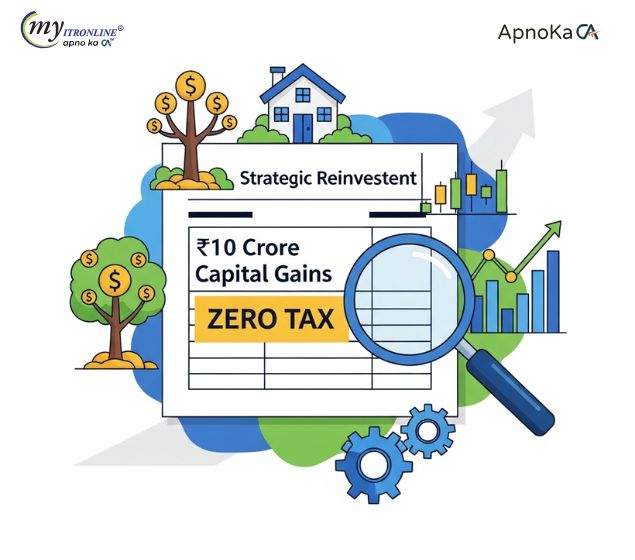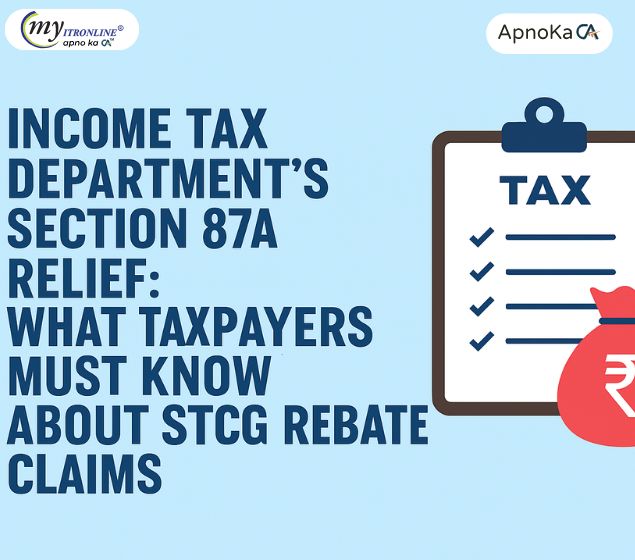# ltcg
12 posts in `ltcg` tag

Finally! The 2025 Capital Gains Relief Scheme is Making Life Easier
The 2025 Amendment Scheme has modernised the Capital Gains Account Scheme (CGAS) by making it digital-first and easier to use. Taxpayers can now deposit capital gains online through Net Banking, UPI, RTGS, or NEFT, with the deposit date clearly defined. Electronic statements replace passbooks, more banks are authorised to manage CGAS accounts, and simpler ITR forms are on the way. With broader exemptions like Section 54GA included, the scheme reduces stress and makes compliance smoother for property sellers, NRIs, and businesses.

Pay Zero Tax on 10 Crore Capital Gains: Your Guide to Strategic Reinvestment
Selling a big asset like property, stocks, or gold can lead to huge capital gains and a big tax bill. But if you reinvest smartly, you can claim full exemption under Section 54 or 54F, up to ₹10 Crore. This blog explains how to do it, the deadlines, and the rules to follow.

Income Tax Department’s Section 87A Relief: What Taxpayers Must Know About STCG Rebate Claims
The Income Tax Department has issued relief for taxpayers who claimed Section 87A rebate on short-term capital gains (STCG). If demands are paid by December 31, 2025, interest will be waived. Learn what went wrong, what’s been clarified, and what you should do next.

Smart Property Moves: How Sections 54 and 54F Can Slash Your Tax Bill on Residential Property Sales (Latest Rules 2025)
Discover how Sections 54 and 54F of the Indian Income Tax Act provide crucial tax exemptions on Long-Term Capital Gains from property sales. This comprehensive guide covers the latest rules for 2025, including the new ₹10 Crore cap and the two-house option under Section 54, offering practical examples and a step-by-step plan for effective tax planning.

Don't Pay 20% LTCG Tax! How to Use Sections 54, 54EC, 54F
This blog post provides a comprehensive yet easy-to-understand guide to saving Long-Term Capital Gains (LTCG) tax arising from property sales in India. It delves into three crucial sections of the Income Tax Act – Section 54, Section 54EC, and Section 54F – detailing their eligibility criteria, investment options, time limits for reinvestment, and lock-in periods. The post also includes a comparative table and a practical example to illustrate how these exemptions work, empowering taxpayers to make informed decisions and potentially reduce their tax liabilities.
.jpg)
LTCG Tax: Recent Updates & 2025 Bill Clarifications
Recent changes to Long Term Capital Gains (LTCG) tax rates and rules, which take effect on July 23, 2024, have greatly affected how investors figure their tax liability for the Assessment Year 2025-26. This blog post outlines these important updates across different asset classes, including equity, debt, and real estate. It explains the details of indexation and clears up common misunderstandings, especially related to the Income Tax Bill, 2025. It highlights the need for careful tax planning and urges taxpayers to get expert help.
.jpg)
Big News for Property Sellers: IREDA Bonds Now Offer Up to 50 Lakh Tax Exemption on Capital Gains!
This blog post details how the Central Board of Direct Taxes (CBDT) has granted "54EC status" to IREDA bonds, offering property sellers a significant tax exemption of up to 50 lakh on long-term capital gains. It explains what 54EC bonds are, why IREDA's inclusion is beneficial for both investors and India's green energy goals, how the tax exemption works, key investment considerations like limits and lock-in periods, and who can invest. The post highlights the advantages of investing in these safe, fixed-return bonds while contributing to a sustainable future.
.jpg)
Tax Smart: Your Easy Guide to Capital Gains in India
This blog provides a simple and easy-to-understand guide to Capital Gains Tax rates in India for various assets like shares, mutual funds (debt & equity), gold, and property, differentiating between short-term and long-term gains.
.jpg)
Capital Gains Tax Changes: New Rules and Rates Start July 23, 2024!
This blog post deciphers the significant changes to Capital Gains Tax in India, effective from July 23, 2024, as introduced in the Union Budget 2024. It simplifies the concepts of Short-Term and Long-Term Capital Gains, detailing the new holding periods and updated tax rates for various assets like listed shares, equity and debt mutual funds, property, and gold. The article highlights key implications for taxpayers and emphasizes the importance of professional advice from Myitronline for navigating these complex rules and optimizing investment strategies.
.jpg)
CII for FY 2025-26 Notified: What India's New Cost Inflation Index Means for Your Capital Gains
The Central Board of Direct Taxes (CBDT) has announced the Cost Inflation Index (CII) for FY 2025-26 as 376. This blog post explains what CII is, how the new index will be applied from AY 2026-27, who it impacts, and provides an example of how it reduces taxable long-term capital gains, particularly for real estate acquired before July 23, 2024. It highlights the importance of understanding this update for accurate tax filing.

How to Save Tax on Capital Gains: Key Exemptions and Step-by-Step Claim Guide
This blog explains the key exemptions available under India’s capital gains tax laws for FY 2025-26, including the latest updates from Budget 2025. It covers who can claim each exemption, how to utilize the Capital Gain Account Scheme, and the correct process for claiming exemptions in your income tax return.

ITR-1 and ITR-4 Forms for AY 2025-26 Released Early: All You Need to Know
The Central Board of Direct Taxes (CBDT) has kickstarted the income tax filing season earlier than usual by releasing the ITR-1 (Sahaj) and ITR-4 (Sugam) forms for Assessment Year 2025-26. This blog explores the eligibility, permissible income sources, and filing restrictions for both forms. It also highlights a major update—taxpayers can now report Long-Term Capital Gains (LTCG) under Section 112A in ITR-1 and ITR-4 under specific conditions. Additionally, it explains the difference between form notification and utility release, emphasizes the importance of early preparation, and provides a comprehensive document checklist for smooth filing. The blog concludes by urging taxpayers to be proactive and file early to avoid last-minute hassles.
